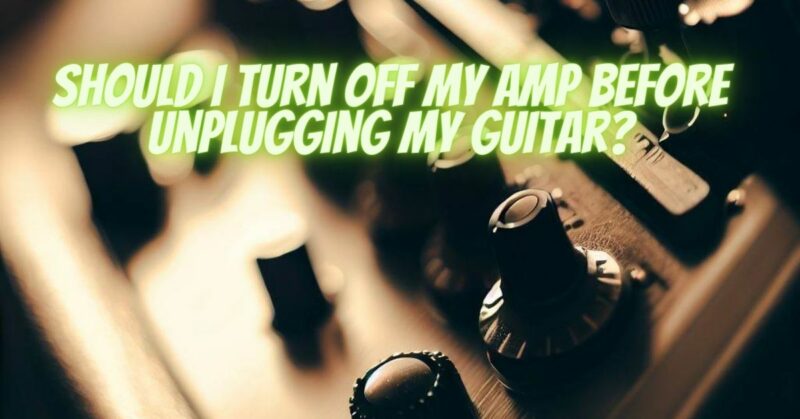As a guitarist, you’ve probably faced the question of whether to turn off your amplifier before unplugging your guitar. While it might seem like a minor decision, it can have implications for your equipment’s longevity, performance, and overall sound quality. In this article, we will delve into the reasons behind this debate and provide guidance on whether you should turn off your amp before disconnecting your guitar.
Understanding the Debate:
The debate over whether to turn off your guitar amplifier before unplugging your guitar arises from concerns about potential damage to your equipment and the generation of unwanted noise. Let’s explore the advantages and disadvantages of both approaches:
Turning Off the Amp Before Unplugging:
Advantages:
- Reduced Risk of Popping Noise: By turning off the amp before unplugging your guitar, you eliminate the risk of generating a loud popping noise that can occur when a live signal is abruptly interrupted. This is particularly important when playing at high volumes.
- Prevention of Feedback: If you’re using high-gain settings or playing with high levels of distortion, turning off the amp before unplugging can help prevent unwanted feedback or screeching sounds.
Disadvantages:
- Interrupted Playability: Turning off the amp before unplugging may be less convenient for quick transitions between songs or instruments, as it requires you to power up the amp again before resuming play.
Unplugging Without Turning Off the Amp:
Advantages:
- Instant Playability: Unplugging your guitar without turning off the amp allows for instant playability, making it easier to switch guitars or take short breaks during performances.
Disadvantages:
- Risk of Popping Noise: Disconnecting your guitar without powering down the amp can result in a loud popping noise that can be unpleasant and potentially harmful to your speakers.
- Potential for Feedback: Leaving the amp on while unplugging your guitar can lead to feedback or unwanted noise, especially when playing with high-gain settings.
Best Practices for Disconnecting Your Guitar:
- Lower the Amp Volume: Regardless of whether you choose to turn off your amp or not, always lower the amplifier’s volume before unplugging your guitar. This minimizes the risk of popping sounds and feedback.
- Use a Mute Switch or Kill Switch: If your guitar is equipped with a mute switch or kill switch, consider using it to momentarily silence your guitar signal before unplugging. This can be particularly helpful during live performances.
- High-Quality Cables: Invest in high-quality instrument cables to reduce the likelihood of generating noise during the disconnection process.
- Consider Your Performance Needs: Your choice of whether to turn off the amp should align with your performance requirements. In a live setting, where quick transitions are crucial, you may opt to unplug without powering down. In a recording environment or when sound quality is paramount, turning off the amp may be preferable.
The decision of whether to turn off your guitar amplifier before unplugging your guitar ultimately depends on your specific needs and preferences. While both approaches have their advantages and disadvantages, following best practices like lowering the amp volume, using high-quality cables, and considering your performance context can help you make the right choice.
Ultimately, the goal is to ensure a smooth and noise-free transition between your guitar and amp while preserving the longevity and performance of your equipment.


